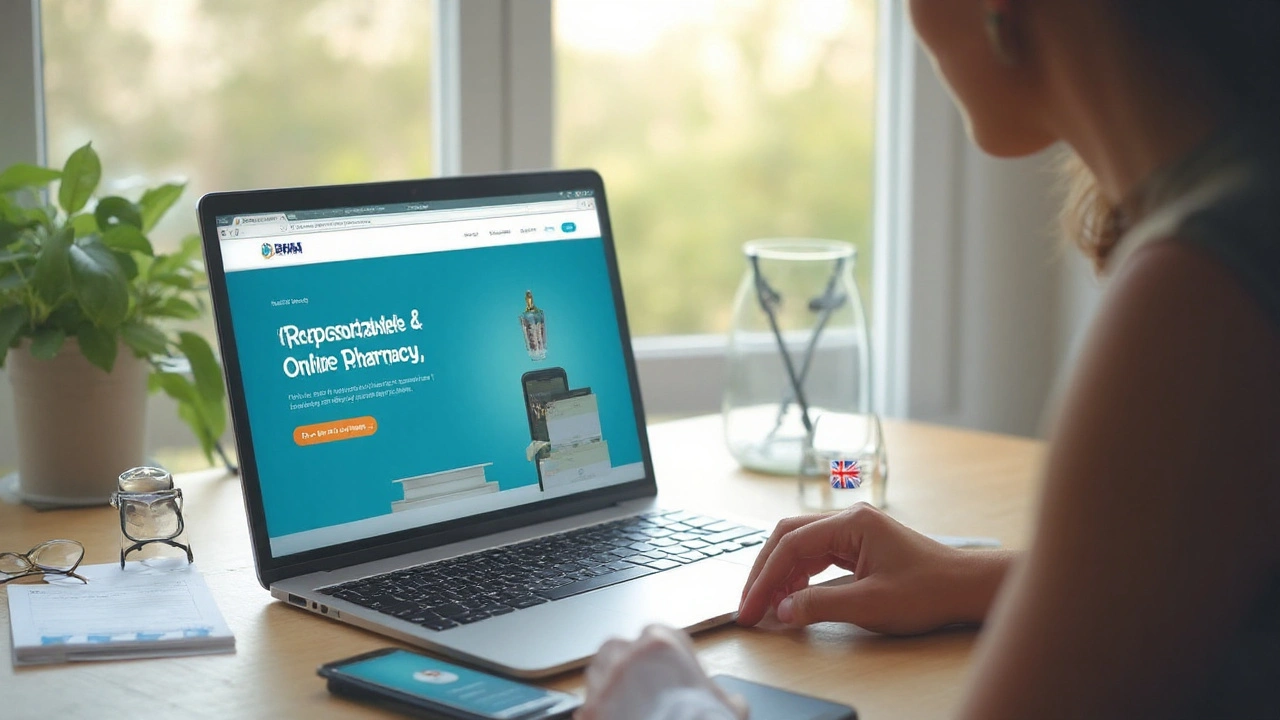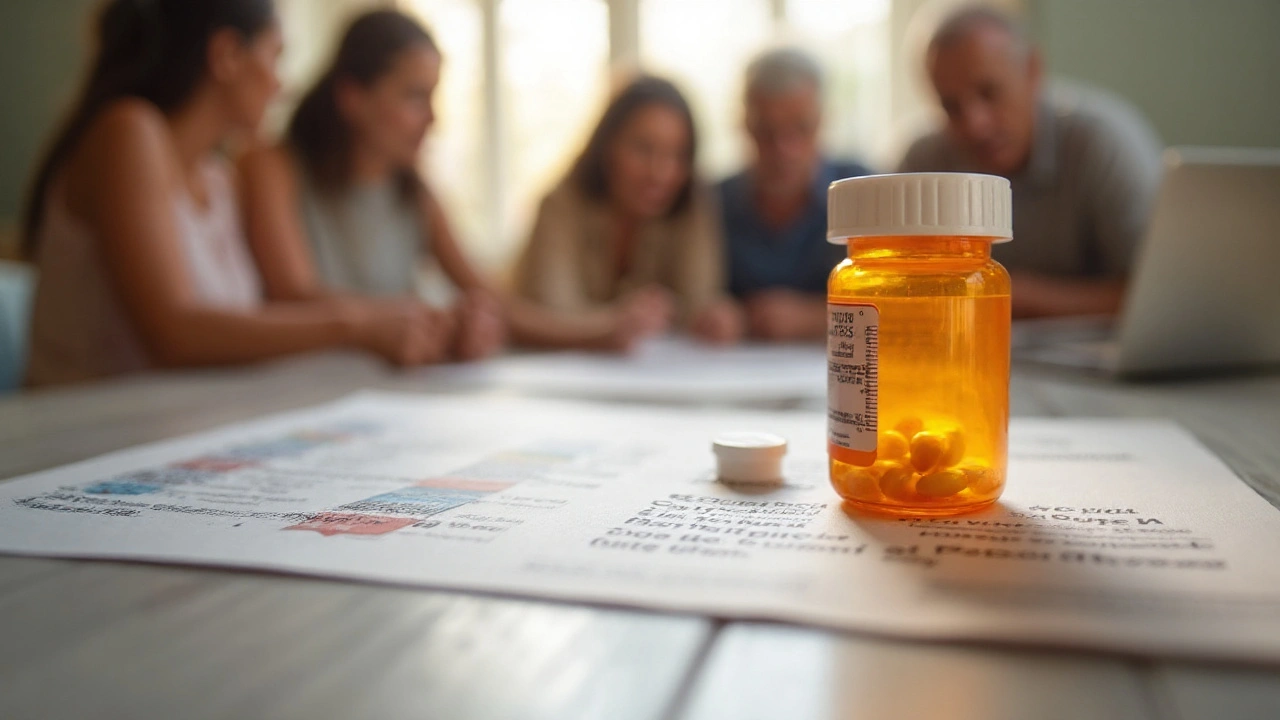Buy Doxycycline Online: Safe Shopping, Trusted Sources & Pharmacy Tips
 Aug, 11 2025
Aug, 11 2025
Ever looked at your medicine cabinet and realised you’re missing a crucial antibiotic just when you need it? Doxycycline isn’t a random paracetamol—it treats serious stuff, from acne flare-ups and chest infections to malaria. These days, you don’t even have to visit your local pharmacy to get a prescription. Tons of people now buy buy doxycycline online, but it’s not as simple as tossing a pack of sweets in your Amazon basket. There’s a wild world out there of legit pharmacies and dodgy sites, different rules for UK buyers, prescription laws that surprise people, and even some brands you might not realise are identical. Here’s the bare truth about how, where, and whether you should grab doxycycline online.
What is Doxycycline and Who Actually Needs It?
This isn’t just about an inconvenient chest infection. Doxycycline is a prescription antibiotic with a long history—first used in the 1960s and still a medical favourite. It’s a go-to for things like chest infections, acne that laughs at face cream, chlamydia, Lyme disease, and even as a malaria preventative for travellers. Unlike some antibiotics, it’s well-absorbed, so doctors trust it for both short and long-term treatments.
Here’s the kicker though: doxycycline shouldn’t be used casually. The more people misuse antibiotics, the faster bacteria learn how to dodge them. The NHS and every reputable doctor bang on about only using antibiotics like doxycycline when you genuinely need them. And yeah, that means with a proper prescription—otherwise you’re just gambling with your health and possibly public safety. Still, tens of thousands of Brits buy antibiotics online every year—sometimes with a prescription, sometimes not. It’s legal with a doctor’s order, but risky and technically illegal without one.
While searching for doxycycline, you’ll also see brand names like Vibramycin, Doryx, and various generic options. They work exactly the same, but prices and pill designs vary wildly. Make sure you double-check the active ingredient rather than just going by packaging.
How to Get a Doxycycline Prescription Online (and Why You Need One)
Some people are surprised: you can’t just buy doxycycline over the counter in the UK. Pharmacies—online and in person—aren’t allowed to sell it without a legit prescription. But online clinics and pharmacies have made it easier than ever to get one. Usually, you’ll fill in a simple health questionnaire—sometimes you’ll have a quick phone or video chat with a real doctor. If everything checks out, a doctor reviews your answers and sends a prescription straight to the online pharmacy, often the same day. It’s pretty smooth, but don’t lie: they can reject your request if your answers don’t match up.
Here are the typical steps most reputable UK online services follow:
- Pick doxycycline from their medicine list (be clear about your reason, like “travel malaria prevention” or “acne treatment”).
- Complete the health questionnaire. Expect questions on allergies, long-term illnesses, and other drugs you might be taking.
- Some sites require photo ID or proof of address—it’s a legal thing.
- A GMC-registered doctor reviews your answers and decides whether it’s safe.
- If approved, the script goes to their attached pharmacy and they ship the pills, usually in discreet packaging.
This method meets all UK regulations and keeps you out of trouble. Don’t be tempted by foreign sites that promise antibiotics with “no prescription needed”—those are usually illegal for UK buyers and could mean counterfeit or weirdly dosed meds.

Spotting Legitimate Online Pharmacies vs Scams
If you type “buy doxycycline UK” into Google, you’ll see hundreds of options. Not all are safe or real. Some operate in legal grey areas; others outright lie about their credentials. So how do you know which ones won’t take your money and ghost you, or even worse, send you fake or dangerous medication?
Here are the big green flags for UK buyers:
- They’re registered with the General Pharmaceutical Council (GPhC). Their registration number should be easy to find on the site—double-check it on the GPhC website.
- For online clinics: they have a CQC (Care Quality Commission) registration if based in England.
- Prescriptions are signed off by UK-based, GMC-registered doctors (sometimes you can even see doctor profiles).
- There’s a real address somewhere, usually a UK-based dispensing pharmacy, not just a PO Box.
- No obvious hard-selling or popups shouting “SALE! NO PRESCRIPTION NEEDED!”
If you’re not sure, a good tip is to pick a pharmacy you’ve seen advertised by UK health authorities, NHS pages, or even big supermarket brands. If a website looks like it was slapped together in five minutes, or is hosted in a country you’ve never visited, skip it. Even if their prices seem amazing, the risks aren’t worth it.
Here’s a data table showing some of the top UK-registered online pharmacies and what makes them stand out:
| Pharmacy Name | Registration | Doctor Review? | Payment Options | Usual Delivery Time |
|---|---|---|---|---|
| LloydsPharmacy Online Doctor | GPhC, CQC | Yes | Debit/Credit, PayPal | 24-48 hours |
| Superdrug Online Doctor | GPhC, CQC | Yes | Debit/Credit, Apple Pay | 24-48 hours |
| Pharmacierge | GPhC | Sometimes | Card, BACS | 1-3 days |
| Boots Online Pharmacy | GPhC | Possible (if using Boots Online Doctor) | Debit/Credit, PayPal | 24-72 hours |
Stick to these names or others you know from the high street for total peace of mind.
What to Expect When Buying: Prices, Delivery and Legal Limits
Prescription medicine costs can be a shock. While on the NHS doxycycline is often free (or just a standard prescription fee), private online pharmacies set their own prices, which vary widely. In August 2025, prices for a week’s course can range from £12 to £35, depending on dose, reason, and brand. Malaria prevention packs often cost more—sometimes £45 for a month’s supply.
Most trusted sites let you pay by regular credit or debit cards. Some now even offer Apple Pay or Klarna for split payments, but avoid pharmacies that want tricky payment methods like cryptocurrency, Western Union, or bank transfers to overseas accounts. These are major warning signs that they aren’t working legally in the UK.
Delivery is usually pretty fast—24 to 72 hours for most UK orders. Next-day delivery options are almost always there if you order before a certain time. Packages are always plain and boring—nobody but you will know what’s inside. Some pharmacies offer ‘click and collect’ if you want to pick up your medicine from a local branch.
If you’re planning to travel and need doxycycline for malaria prevention, order at least two weeks in advance. Sometimes, customs rules abroad mean your package can get delayed or blocked if you try to export medicine yourself, even when it’s for personal use.
Now for the law bit: buying antibiotics without a prescription is illegal in the UK—both online and in person. Thousands of online sellers in Asia or Eastern Europe ignore this, but don’t trust them. Not only are you risking fake or ineffective medicine, but customs can seize your order—worst case, you get in actual trouble if you try to import prescription drugs without the right documentation.

Troubleshooting: Common Issues, Side Effects, and When to See a Doctor
Getting your hands on real doxycycline is just the start. Even used properly, it can trigger side effects—sometimes mild, sometimes a big deal. Most people won’t get more than a weird taste in their mouth or a dodgy stomach, but some feel nausea (up to 20%), or sun sensitivity. In rare cases, people get serious allergic reactions or throat irritation, especially if they take it before lying down—always swallow with a big glass of water and stay upright for at least 30 minutes afterward.
Here are some tips to cut down problems:
- Avoid taking it with milk or antacids—these block absorption.
- Wear high-factor sunscreen—serious sunburn isn’t rare.
- Finish the course, even if you feel better—stopping early breeds resistant bacteria.
- If you get a rash, struggle to breathe, or your face swells, call 999 immediately—could be an allergic reaction.
- Got women’s health concerns? Doxycycline can reduce the effectiveness of the combined pill—use a backup method when on antibiotics and for a week after.
Occasionally, problems crop up after ordering: delays, missing packages, or strange pills. If your tablets look weird (broken, different colour, odd smell), stop and check with the pharmacy. Take pictures—don’t just ignore your gut feeling. UK pharmacies are required to listen if you have concerns, offer a refund, and investigate batch numbers.
And watch out for legal changes. The Medicines and Healthcare products Regulatory Agency (MHRA) tweaks rules every year, so what’s possible in 2025 probably won’t be the same next year. Always check if your chosen pharmacy is still registered and up to date.

Pastor Ken Kook
August 16, 2025 AT 13:13Good practical checklist for anyone tempted to buy online - trust the regulated sites and skip the sketchy overseas sellers. 🙂
Watch for GPhC numbers and CQC listings, and don't hand over money to sites asking for crypto or weird transfer methods.
Also keep receipts and photos of any odd pills so you can report dodgy batches quickly.
Johanna Sinisalo
August 18, 2025 AT 08:53Prescription-based access is the safe route and the one I'd always nudge people toward.
Online clinics that run a short medical review, verify ID, and use GMC-registered doctors are doing what they should to protect patients. If you need doxycycline for travel prophylaxis, acne, or an infection, make sure you disclose current meds and allergies on the questionnaire so the prescriber has the full picture.
Keep a copy of the prescription and the pharmacy's contact info in case there are delivery problems or adverse effects afterwards.
Jennifer Harris
August 20, 2025 AT 02:33Personal experience chiming in - when I used an online clinic for malaria prophylaxis, the process was straightforward and the pills arrived discreetly in two days.
I followed the doctor’s guidance and started the medication with plenty of water, stayed upright for half an hour, and took extra sun precautions while abroad.
Side effects were mild and manageable, and the pharmacy responded quickly when I asked about batch details.
Northern Lass
August 21, 2025 AT 20:13Regulatory clarity is everything, and the piece nails that point plainly: do not bypass oversight.
There is an illusion of convenience wrapped around the promise of doorstep antibiotics, but beneath that veneer lies a minefield of counterfeit products, improper dosing, and regulatory evasion.
Consumers must treat medication procurement as a serious transaction with legal and medical consequences, not a casual online shopping habit.
Legitimate suppliers will present verifiable credentials, transparent contact details, and a robust clinical review process that leaves a paper trail.
Anything less - obfuscated ownership, offshore payment routing, or a “no prescription” banner - should trigger an immediate retreat from the checkout.
Antimicrobial stewardship is not an abstract slogan; it is a public health imperative that requires individual restraint.
Each rogue purchase chips away at antibiotic efficacy by encouraging resistance patterns that clinicians will struggle to treat.
Further, improper storage and transit can degrade active ingredients, rendering a once-useful drug inert and giving a false sense of protection.
Travel medicine scenarios deserve extra scrutiny because customs and export rules introduce additional risks that the casual buyer frequently overlooks.
Prescribers issuing remote scripts must be accountable and traceable, and pharmacies dispensing the product must accept and act upon adverse event reports.
When a system supports recall and batch investigation, the consumer retains recourse; without that infrastructure, the worst-case outcomes multiply.
It is prudent to keep photographic evidence of packaging and pills should an investigation be necessary, and to register any complaint with the appropriate regulator.
Adopt skepticism as a practical habit: if the deal sounds too good, treat it as toxic until proven otherwise, and opt for high-street, registered providers when possible.
Doing so preserves personal safety and contributes, in aggregate, to the preservation of antibiotic effectiveness for everyone.
johnson mose
August 23, 2025 AT 13:53Top-level practical tips: always check active ingredient and dosage, not just brand art on the blister pack.
Also, avoid taking doxycycline with dairy or antacids, and be religious about sunscreen while on it - sunburns are surprisingly common.
For travellers, order earlier than you think you need the med so customs delays don't mess up the schedule.
Charmaine De Castro
August 25, 2025 AT 07:33Keep calm and document everything if a package looks off.
Take clear photos of packets, expiry dates and any odd pill coloration, then contact the pharmacy before taking anything suspicious.
If the pharmacy is reputable they will investigate batch numbers and arrange a refund or replacement promptly.
Mark Mendoza
August 27, 2025 AT 01:13Solid sovereign advice above - regulation and evidence over cheap thrills. 😊
Also worth noting is the psychological comfort in using an established service: it reduces second‑guessing and improves adherence because you trust the source.
Dan Tourangeau
August 28, 2025 AT 18:53Nicely put earlier about keeping receipts; tiny bureaucratic acts save big headaches later.
One minor grammar nudge for official queries: when you forward documentation, label files clearly with date and order number so support teams can act faster.
Bernard Valentinetti
August 30, 2025 AT 12:33Ah - the modern paradox; the world shrinks while regulatory oversight expands...well, not everywhere.
People want immediacy; they want the pill now; they want certainty; they sign forms they barely read; they trust glossy pages more than institutions.
Yet medicines are not merely commodities; they are distilled promises between clinician and patient.
Buy cheaply and you may pay dearly later, in lost efficacy, adverse events, or worse - social consequences of rising resistance.
Buy wisely and you preserve both personal health and communal benefit; that is the ethical axis here.
Kenneth Obukwelu
September 1, 2025 AT 06:13For anyone planning to travel: customs can be unpredictable and rules differ wildly by country.
Carry prescriptions, keep meds in original packaging, and have a printout of the prescribing clinician’s contact in case border agents ask for proof.
Also, remember malaria regimens vary by region and resistance patterns, so follow a UK-prescribed schedule if travelling from the UK to higher-risk areas.
One more thing - if you need a repeat supply abroad, find a local registered pharmacy rather than importing more from unknown webshops.
Pastor Ken Kook
September 2, 2025 AT 23:53Nice point, thanks 😊
johnson mose
September 15, 2025 AT 03:33Building on the sun and interaction tips from above, there are a few everyday moves that really help reduce harm.
First, set reminders so you don't miss doses - antibiotics are only useful when taken consistently, and missed doses invite resistance.
Second, if you experience persistent nausea, take the pill with a light snack that doesn't contain milk; that often eases the stomach without blocking absorption.
Third, keep a symptom diary if you're on a longer course so you can report patterns to a clinician quickly.
Fourth, store medication in a cool dry place away from direct sunlight, not in the bathroom where humidity fluctuates.
Fifth, if you plan sun exposure, choose clothing and shade as first-line protection and use sunscreen as a backup.
Sixth, never share antibiotics with partners or friends; dosing needs vary and sharing can do more harm than good.
Seventh, when disposing of unused meds, use pharmacy take-back schemes rather than household trash to avoid environmental contamination.
Eighth, be mindful that hormonal contraception can be less reliable with some antibiotics, so use backups if relevant.
Ninth, if you have chronic conditions or take other prescribed drugs, flag that to the prescriber explicitly so interactions are caught.
Tenth, trust but verify: if a supplied medicine looks or smells off, pause and ask for batch confirmation before continuing.
Eleventh, keep emergency contacts and your GP in the loop if you start new antibiotics, especially if side effects crop up.
Twelfth, if a prescriber declines to issue a script after review, accept that as part of responsible care rather than a personal slight.
Thirteenth, stay informed about MHRA updates since regulatory changes can affect availability and import rules unexpectedly.